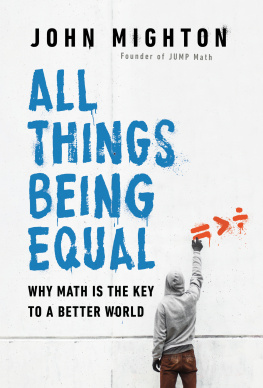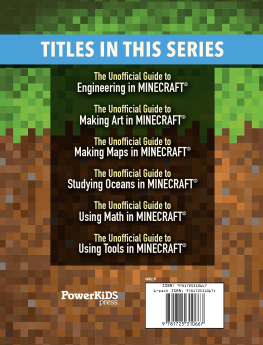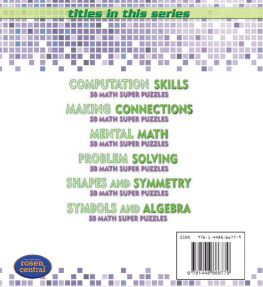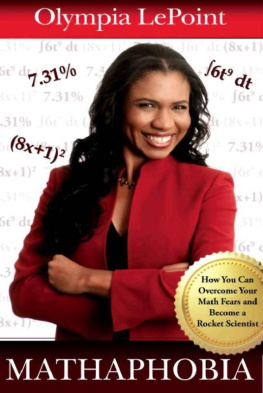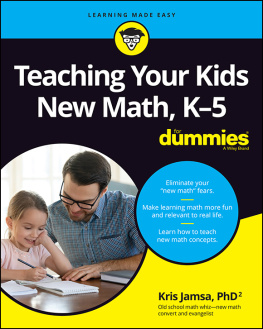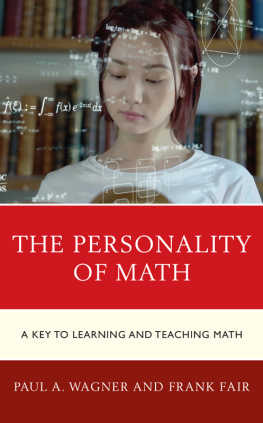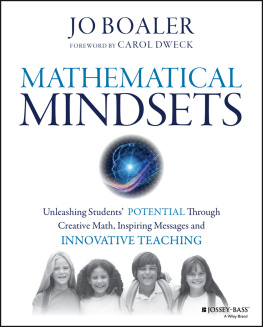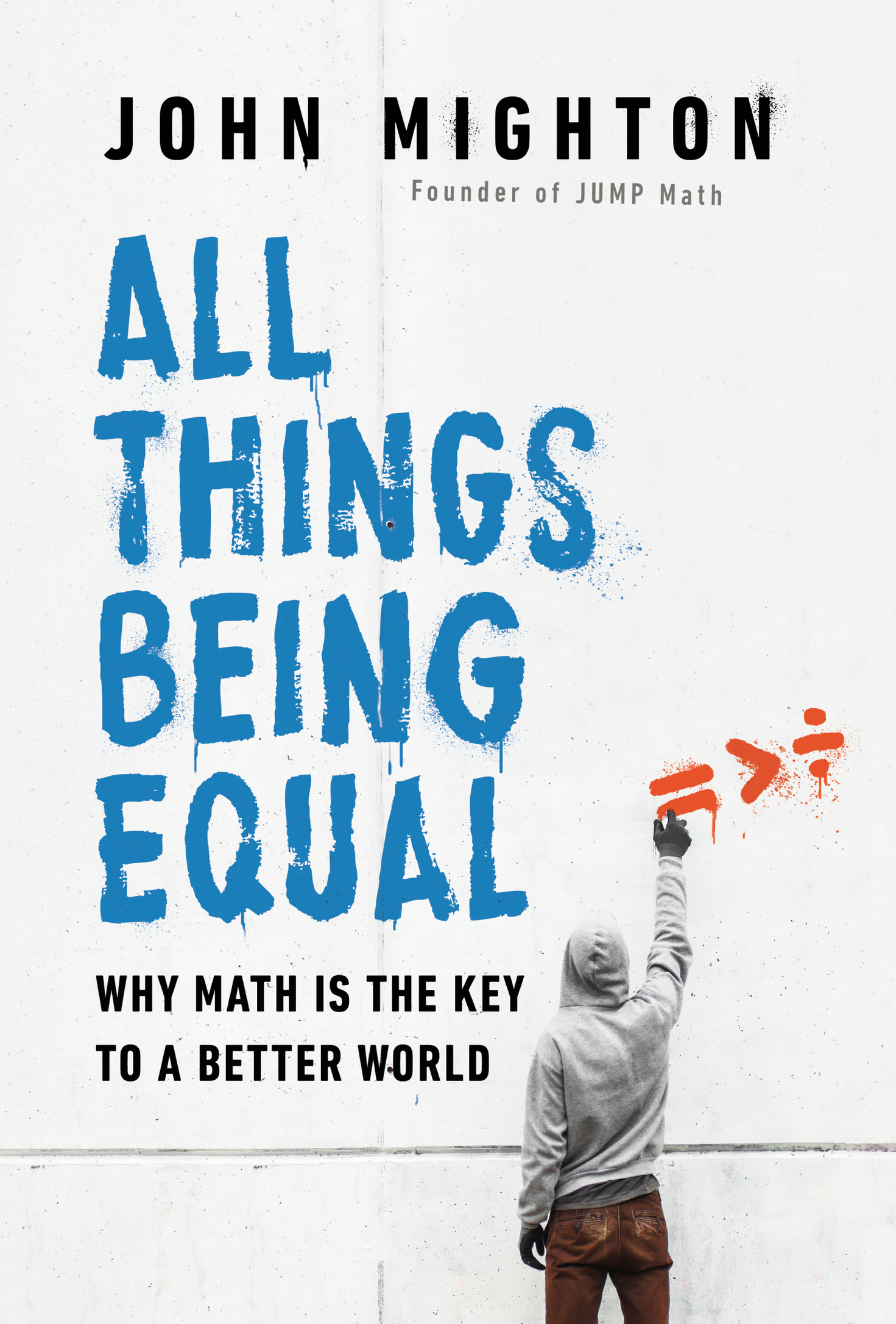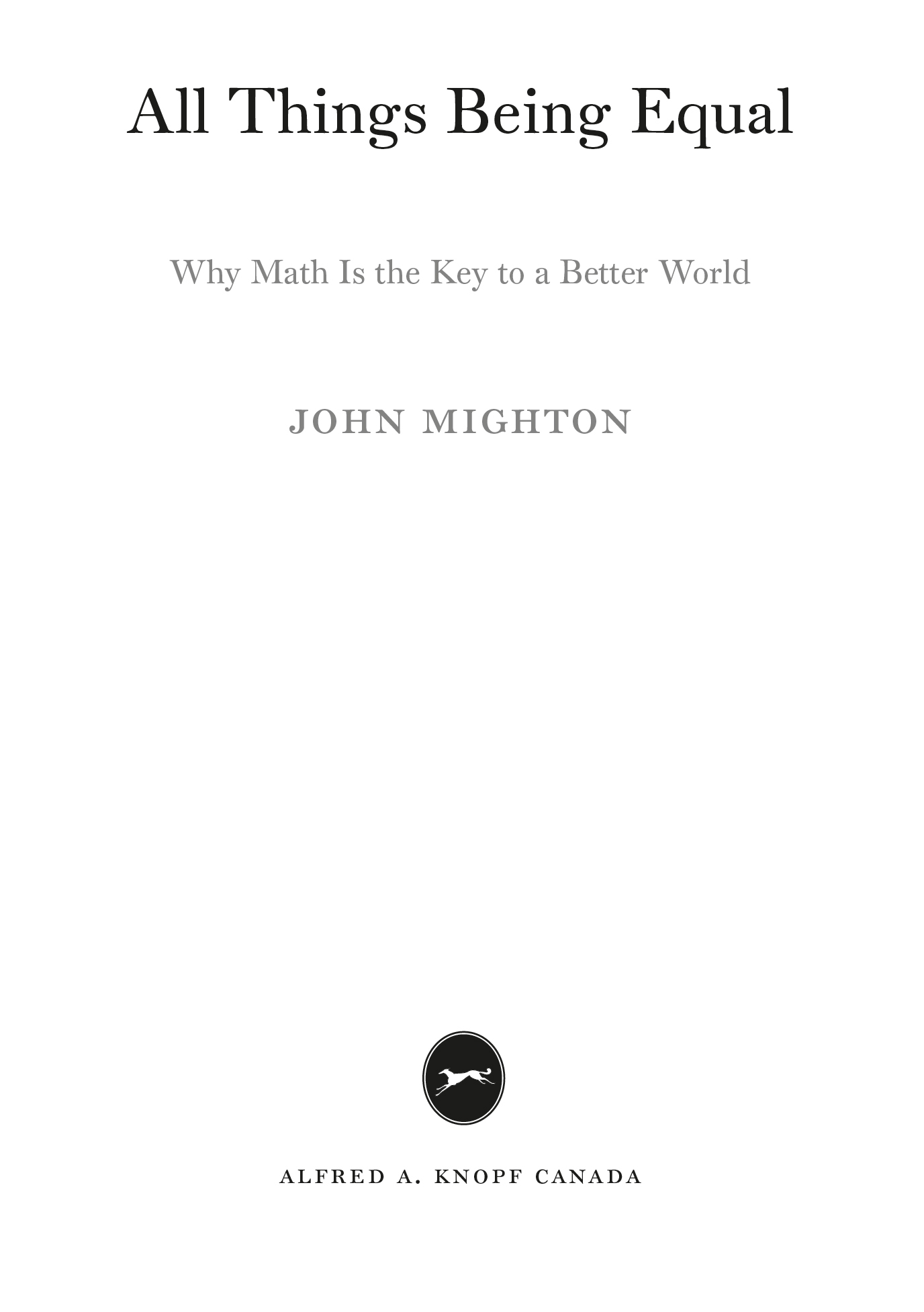PUBLISHED BY ALFRED A. KNOPF CANADA
All rights reserved under International and Pan-American Copyright Conventions.
No part of this book may be reproduced in any form or by any electronic or mechanical means, including information storage and retrieval systems, without permission in writing from the publisher, except by a reviewer, who may quote brief passages in a review. Published in 2020 by Alfred A. Knopf Canada, a division of Penguin Random House Canada Limited, Toronto. Distributed in Canada by Penguin Random House Canada Limited, Toronto.
Knopf Canada and colophon are registered trademarks.
Title: All things being equal : why math is the key to a better world / John Mighton.
Names: Mighton, John, 1957- author.
Identifiers: Canadiana (print) 20190158557 | Canadiana (ebook) 20190158611 | ISBN 9780735272897 (hardcover) | ISBN 9780735272910 (HTML)
Subjects: LCSH: MathematicsSocial aspects. | LCSH: Numeracy.
INTRODUCTION
Nothing comes easily to me.
Im a mathematician, but I didnt show much aptitude for math until I was thirty. I had no idea, in high school, why I had to turn a fraction upside down when I wanted to divide by it, or why, when I wrote a square root sign over a negative number, the number suddenly became imaginary (especially when I could see the number was still there). At university I almost failed my first calculus course. Fortunately I was saved by the bell curve, which brought my original mark up to a C minus.
Im also a playwright. My plays have been performed in many countries, but I still wont read a review unless someone tells me its safe to do so. Early in my career I made the mistake of checking the papers to see what two of the local critics thought of my first major production. It seems unlikely that they consulted each other before writing their reviews, but one headline read Hopelessly Muddled and the other Muddled Mess.
I often wish I was more like my literary and scientific heroes, who seemingly could produce perfect poems or solve intractable problems in a blinding flash of inspiration. Now that Im a professional mathematician and writer, I console myself with the thought that my ongoing struggles to educate myself and the strenuous efforts that I needed to make to get to this point have produced an intense curiosity about how we achieve our potential.
A Slow Learner
From an early age I became obsessed with my intellectual capabilities and with the way I learn. When I started to teach in my twenties, first as a graduate student in philosophy and later as a math tutor, I also became fascinated with the way other people learn. Now, after teaching math and other subjects to thousands of students of all ages and after reading a great deal of educational and psychological research, I am convinced that our society vastly underestimates the intellectual potential of children and adults.
During my undergraduate studies, I showed as little promise in writing as I did in mathematics: I received a B plus in my creative writing classthe lowest mark in the class. One evening, in the first year of my graduate studies in philosophy, I began reading a book of letters by the poet Sylvia Plath, which Id found on my sisters bookshelf while babysitting her children. It appeared from Plaths letters and early poems that she had taught herself to write by sheer determination. She had learned, as a teenager, everything she could about poetic metre and form. She wrote sonnets and sestinas, memorized the thesaurus and read mythology. She also produced dozens of imitations of poems she loved.
I knew that Plath was considered to be one of the most original poets of her time, so I was surprised to learn that she had taught herself to write by a process that seemed so mechanical and uninspired. Id grown up thinking that if a person was born to be a writer or mathematician, then fully formed and profoundly important sentences or equations would simply pour out of them. Id spent many hours sitting in front of blank pages waiting for something interesting to appear, but nothing ever did. After reading Plaths letters, I began to hope that there might be a path I could follow to develop a voice of my own.
I imitated the work of Plath and other poets for several years before I moved on to writing plays. By that time, Id taken a job at a tutoring agency to supplement my income from writing. The women who owned the agency hired me to tutor math because Id taken a course in calculus at university (and I neglected to tell them about my marks). In my tutorials I had the opportunity to work through the same topics and problems again and again with my students, who ranged in age from six to sixteen. The concepts that had mystified me as a teenager (such as why does a negative times a negative equal a positive) gradually became clear, and my confidence grew as I found I could learn new material more quickly.
One of my first students was a shy eleven-year-old boy named Andrew, who struggled in math. In grade six, Andrew was placed in a remedial class. His new teacher warned his mother that she shouldnt expect much from her son because he was too intellectually challenged to learn math in a regular math class. In the first two years of our tutorials, Andrews confidence grew steadily, and by grade eight, he had transferred to the academic stream in math. I tutored him until he was in grade twelve, but I lost touch with him until recently when he invited me to lunch. In the middle of our lunch, Andrew told me that he had just been granted full tenure as a professor of mathematics.
When I was growing up I would always compare myself to the students who did well on math competitions and who seemed to learn new concepts without effort. Watching these students race ahead of me at school made me think that I lacked the natural gift I needed to be good at the subject. But now, at the age of thirty, I was surprised to see how quickly I could learn the concepts I was teaching, and how easy it was for students like Andrew, who had never shown any signs of having a gift for math, to excel at the subject with patient teaching. I began to suspect that a root cause of many individuals troubles in math, and in other subjects as well, is the belief in natural talents and natural academic hierarchies.
As early as kindergarten, children start to compare themselves to their peers and to identify some as talented or smart in various subjects. Children who decide that they are not talented will often stop paying attention or making an effort to do well (as I did in school). This problem is likely to compound itself more quickly in math than in other subjects, because when you miss a step in math it is usually impossible to understand what comes next. The cycle is vicious: the more a person fails, the more their negative view of their abilities is reinforced, and the less efficiently they learn. I will argue that the belief in natural hierarchies is far more instrumental in causing peoples different levels of success in math and other subjects than are inborn or natural abilities.

